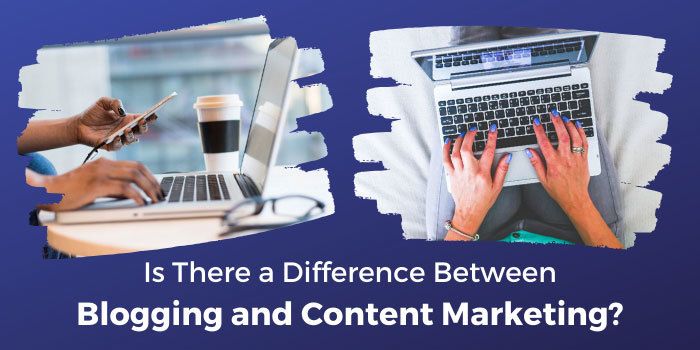Blogging and content marketing are similar in a lot of ways – they both involve written content, have similar requirements like research and SEO, and most important of all, they are both used to generate sales and leads. Even a seasoned marketer will have trouble telling the two apart without additional context to give lend a helping hand.
So, is there a difference between them at all, and if so, why is it important for you to be able to tell?

The gist of it is that blogging is a form of content writing that’s used to tell a story about your company – it doesn’t need a specific purpose other than the story itself. Content marketing may or may not tell a story – that depends on the content strategy your company chooses to employ. The more specific bits of it are that content marketing guides buyers at different stages of the marketing funnel and guides them along.
Both blogging and content marketing have their place – blogging is highly effective for drawing customers in, but doesn’t do much for conversions. Content marketing is great for guiding a potential customer down the sales funnel but not so much at the initial stages. There’s a bit more detail to it, however, so here goes.
Blogging and its importance

For most brands, blogging is the most common of the two practices. It involves creating content that’s used to communicate with your potential customers. Blogs, in general, take many forms – personal blogs, political blogs, and so on – but blogs maintained by brands have to be managed in specific ways.
The most obvious rule governing how a branded blog should be run is that it should strictly be for brand-related copies. No political posts and no personal posts (e.g. personal relationships) are allowed. And the main difference between content marketing and blogging is the intent.
Blogging is meant to create value primarily to the reader. By writing posts that resonate with problems your target audience has, a company can show that they are more than just words and a big name. It helps to humanize your brand and make it more easy to relate to.
Producing interesting content is an effective inbound marketing strategy that’s been in use by brands for quite a while. Regularly creating content also gives people a reason to visit your website and once they are done, maybe they’ll stick around to see what else you have to offer. It’s the lifeblood of all marketing campaigns, after all.
Potential customers aren’t the only ones that love fresh content. The frequency of posting is one of the most fundamental ranking factors used by Google. The more often you post, the better you will rank.
Content marketing and how it’s different

To the untrained eye, there is no immediate difference between a content marketing piece and a blog post. The difference between blogging and content marketing starts to become more apparent once you’re involved in the actual process.
The most immediate difference between blog posts and content marketing pieces is length and scale. Content marketing pieces tend to be much longer and are usually a lot more comprehensive than blog posts, which, while they do exist at scale, don’t usually feature nearly the same breadth.
Due to their significantly larger breadth of coverage, content marketing pieces tend to involve a lot more effort to create than blog posts, which brings us to the second major category of differences between the two types of content. Marketing copies require a significantly larger amount of work to put together than blog posts. This is relevant if you consider the following factors:
- Research: Blog posts tend to revolve around topics that the person writing is already familiar with. As such, they require little to no research to write. Content marketing pieces, on the other hand, require more digging around since they contain a lot more information.
- Target audience: One area of research most brands focus on is looking for their target audience. A buyer persona is a virtual representation of who the brand’s ideal customer is. All marketing content that is created is done so with the buyer persona in mind.
- Backlinking strategies: Another way length is relevant with regards to content marketing copies is the presence or absence of a backlinking strategy. A blog post is going to contain references to other sites, just like a content marketing strategy, but the latter takes it further. A common backlinking strategy is to contact site owners to write guest posts and have them link to your site, for example.
- Data analytics: Content marketing pieces always include data. At the end of the day, this data is funneled back into the content creation process to inform future content marketing pieces and to improve on areas where the campaign falls short.
Many marketers consider content marketing to be an umbrella term that encompasses everything that involves creating content that’s to be consumed by third parties. This includes blogging. Content marketing may, therefore, take forms like:
- Ebooks
- Infographics
- Whitepapers
- Access to research material
- Podcasts
- Video content
- Design and illustration freebies
- Social media
When these approaches are taken, the point of creating content isn’t to promote products directly. Rather, it serves to give potential buyers a new medium for discovering your product/service. This is effective because a lot of people don’t know a problem exists until you bring light to it. Once that’s established, the brand can offer itself as a solution to the problem that they have now highlighted. This should help bring out the next major point: intent.
Content marketing aims to create content that focuses on creating value to the user at different stages of the sales funnel. From the above example, highlighting a problem that exists is part of the initial stages – creating interest.
What kind of content should you create?
Information is only as valuable as the ways it can be used, so which kind of content should you create for your brand?

Despite their differences, content marketing and blogging are not mutually exclusive. Blogging is very effective in certain areas while content marketing as a whole has its domain to reign over. Both of them are important and can be used to pass different messages or communicate with different customers in specific ways.
Blogging should be used as an inbound marketing strategy. By creating valuable content, you give people ample reason to visit your site than simply creating it and hoping it will be discovered by interested users.
Content marketing is a bit more in-depth than that. With all the effort that goes into creating relevant pieces, it’s meant to, first and foremost, drive results and create insights. Content marketing is three times as effective as outbound marketing and costs significantly less, according to Content Marketing Institute.
The most important thing to remember either way it that your blog or content marketing pieces should be part of a larger content marketing strategy. Having this in place helps to inform the kind of value you provide and creates new avenues of driving organic traffic. Otherwise, all your efforts will go to waste.
Additionally, it’s necessary to have other forms of content marketing reside alongside your blogging strategy. Use social media to promote your posts and drive stronger overall results in your content marketing efforts.
Conclusion
Blogging and content marketing are two peas in a pod. Depending on how you look at, blogging can be a crucial component of your wider content marketing strategy or can be fine-tuned to make it more effective at converting. Then, it will be referred to as a content marketing piece.
Both forms of content creation are equally important and should be used at different stages of your sales funnel. Blogging is effective as an inbound marketing strategy while the various forms of content marketing are better suited to conversion and moving customers further down the sales funnel. As such, blogging is more suited to brands that are just starting. Content marketing is for everyone. Jump on to the bandwagon now!

Susan Saurel is a full-time digital marketer and an academic writer from Houston, Texas, Currently, she is working for a custom essay writing service as a remote worker as she likes to travel to experience new cultures across the globe. Her work interest is in subjects of business management, accounting, finance and economics.
Author // Susan Saurel
How I "Finally" Make Over $7,000 Monthly Income
"The most valuable thing I've ever done!"

Thank you for the great post. Now I know the difference between blogging and content marketing. I still believe in blogging and writing good materials like books and Quora posts. There are some people who prefer to read so I would love to keep working on written content marketing methods.
Thank you for sharing your article. I think your writing style is commendable and the structure of your piece is well-executed. But the content it nothing new. It primarily revolves around familiar concepts like research, backlinking, and understanding target audiences. We’ve heard that all before.
These fundamental blogging tactics are extensively covered in many existing resources (as you know because you placed the links). You can be a lot more unique and show advanced strategies that aren’t as commonly discussed, if you know?
Theoretical advice is no longer valuable because everyone knows it. You should come up with practical examples or case studies. You should demonstrate successful implementation of these strategies if you want to enhance the article’s impact and relevance. Readers are looking for more tangible insights and a fresh perspective.
Keep up the good work. I look forward to seeing how you can further develop and deepen the content in your future articles.
Thank you for your explanation. I know very well about the difference now. Keep up the good work.